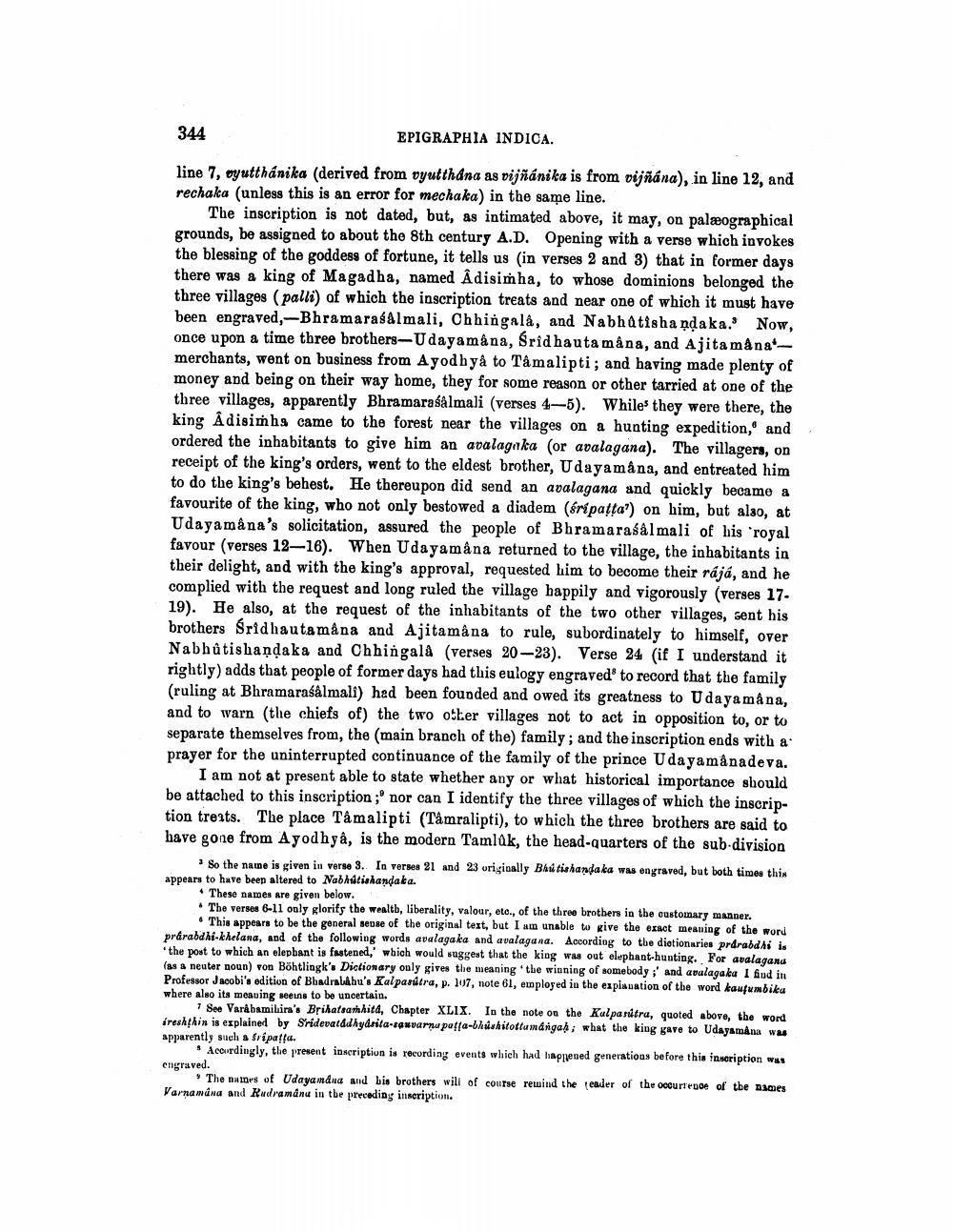________________
344
EPIGRAPHIA INDICA.
line 7, oyutthánika (derived from vyutthána as vijñánika is from vijñána), in line 12, and rechaka (unless this is an error for mechaka) in the same line.
The inscription is not dated, but, as intimated above, it may, on palæographical grounds, be assigned to about the 8th century A.D. Opening with a verse which invokes the blessing of the goddess of fortune, it tells us (in verses 2 and 3) that in former days there was a king of Magadha, named Âdisimha, to whose dominions belonged the three villages (palli) of which the inscription treats and near one of which it must have been engraved, -Bhramarasalmali, Chhingalá, and Nabhatisha ədaka. Now, once upon a time three brothers-Udayamâna, Srid hauta mâna, and Ajitamana merchants, went on business from Ayodhya to Tamalipti; and having made plenty of money and being on their way home, they for some reason or other tarried at one of the three villages, apparently Bhramaraśâlmali (verses 4-5). While they were there, the king Ådisiṁhe came to the forest near the villages on a hunting expedition, and ordered the inhabitants to give him an avalagaka (or avalagana). The villagers, on receipt of the king's orders, went to the eldest brother, Udayamâna, and entreated him to do the king's behest. He thereupon did send an avalagana and quickly became a favourite of the king, who not only bestowed a diadem (Sripatta") on him, but also, at Udayamâna's solicitation, assured the people of Bhramaraśalmali of his "royal favour (verses 12-16). When Udayamâna returned to the village, the inhabitants in their delight, and with the king's approval, requested him to become their rájá, and he complied with the request and long ruled the village happily and vigorously (verses 17. 19). He also, at the request of the inhabitants of the two other villages, sent his brothers Sridhautamana and Ajitamâna to rule, subordinately to himself, over Nabhùtishaņdaka and Chhingala (verses 20-23). Verse 24 (if I understand it rightly) adds that people of former days had this eulogy engraved to record that the family (ruling at Bhramaraśålmali) had been founded and owed its greatness to U dayamana, and to warn (the chiefs of) the two other villages not to act in opposition to, or to separate themselves from, the (main branch of the) family; and the inscription ends with a prayer for the uninterrupted continuance of the family of the prince Udayamånadeva.
I am not at present able to state whether any or what historical importance should be attached to this inscription ;' nor can I identify the three villages of which the inscription treats. The place Tamalipti (Tamralipti), to which the three brothers are said to have gone from Ayodhyâ, is the modern Tamlúk, the head-quarters of the sub-division
So the name is given in verse 3. In verses 21 and 23 originally Bad tishandaka was engraved, but both times this appears to have been altered to Nabhatishandaka.
• These names are given below. • The verses 6-11 only glorify the wealth, liberality, valour, eto, of the three brothers in the customary manner.
• This appears to be the general sense of the original text, but I am unable to give the exact meaning of the word pr&rabdhi-khelang, and of the following words avalagaka and avalagana. Accordiog to the dictionaries prdrabdhi is the post to which an elephant is fastened, which would suggest that the king was out elephant-hunting. For avalagang (as a neuter noun) von Böhtlingk's Dictionary only gives the meaning the winning of somebody; and analagala I find in Professor Jacobi's edition of Bhadralkhu's Kalpasitra, p. 107, note 61, employed in the explanation of the word kaufumbika where also its meaning seems to be uncertain.
See Varábamihira's Brihatsamita, Chapter XLIX. In the note on the Kalpasitra, quoted above, the word íreshthin is explained by Sridevatádkydrita-Touvarnu peffa-bhúshitottamárgab; what the king gave to Udayamána was apparently such a Sripatta.
Acordingly, the present inscription is recording events which had happened generations before this inscription was engraved.
The names of Udaya mdua and bis brothers will of course rewind the reader of the occurrence of the names Varnamna and Rudramanu in the preceding inscription.




